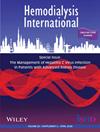Glucose variability in maintenance hemodialysis patients with type 2 diabetes
IF 1.2
4区 医学
Q3 UROLOGY & NEPHROLOGY
引用次数: 1
Abstract
To the Editor: We read with interest the article by Bomholt et al, “Glucose variability in maintenance hemodialysis patients with type 2 diabetes: Comparison of dialysis and non-dialysis days” published online in this journal. With the use of continuous glucose monitoring the study aimed to examine glucose variations induced by hemodialysis (HD) in patients with type 2 diabetes. Similar median sensor glucose values were found for days on and off HD and nocturnal glucose levels were modestly increased on dialysis days. The authors concluded that findings indicate that antidiabetic treatment does not need to be differentiated on dialysis versus nondialysis days in patients with type 2 diabetes undergoing maintenance HD. We congratulate the authors on their efforts in conducting a comprehensive assessment of HD-influenced glucose excursions and highlighting a very clinically relevant topic. We do not have any criticism of the study, but we would like to make a comment and propose a data sub-analysis. The authors suggested that the reduction in plasma insulin possibly explains the nocturnal increase in mean sensor glucose on dialysis days as insulin is removed from plasma in the HD filter by diffusion, convection, and absorption leading to relative hypoinsulinemia. A total of 27 patients were included in the study, 20 were treated with insulin only, 5 were treated with a combination of oral antidiabetics (OADs) and insulin, and 2 with OADs only. As the types of OADs were not stated and they may have varying impacts on glycemia in connection with HD we respectfully suggest providing a similar separate analysis as published with the data of those 20 insulin-only treated patients. We believe it might show a more prominent difference between days on and off HD. In addition, the type of insulin may matter in end-stage renal disease. For example, the pharmacokinetics of insulin detemir or degludec is not affected by renal impairment, whereas this is not true for insulin glargine or human insulin products. Also, an analysis of the correlation between the daily amount of insulin and glucose concentration changes might support the author’s explanation for the above-mentioned glycemia difference. We respectfully suggest taking these points into account, especially if a study continuation is planned.2型糖尿病维持性血液透析患者的血糖变异性。
本文章由计算机程序翻译,如有差异,请以英文原文为准。
求助全文
约1分钟内获得全文
求助全文
来源期刊

Hemodialysis International
UROLOGY & NEPHROLOGY-
CiteScore
2.50
自引率
0.00%
发文量
58
审稿时长
6-12 weeks
期刊介绍:
Hemodialysis International was originally an annual publication containing the Proceedings of the International Symposium on Hemodialysis held in conjunction with the Annual Dialysis Conference. Since 2003, Hemodialysis International is published quarterly and contains original papers on clinical and experimental topics related to dialysis in addition to the Annual Dialysis Conference supplement. This journal is a must-have for nephrologists, nurses, and technicians worldwide. Quarterly issues of Hemodialysis International are included with your membership to the International Society for Hemodialysis.
The journal contains original articles, review articles, and commentary to keep readers completely updated in the field of hemodialysis. Edited by international and multidisciplinary experts, Hemodialysis International disseminates critical information in the field.
 求助内容:
求助内容: 应助结果提醒方式:
应助结果提醒方式:


